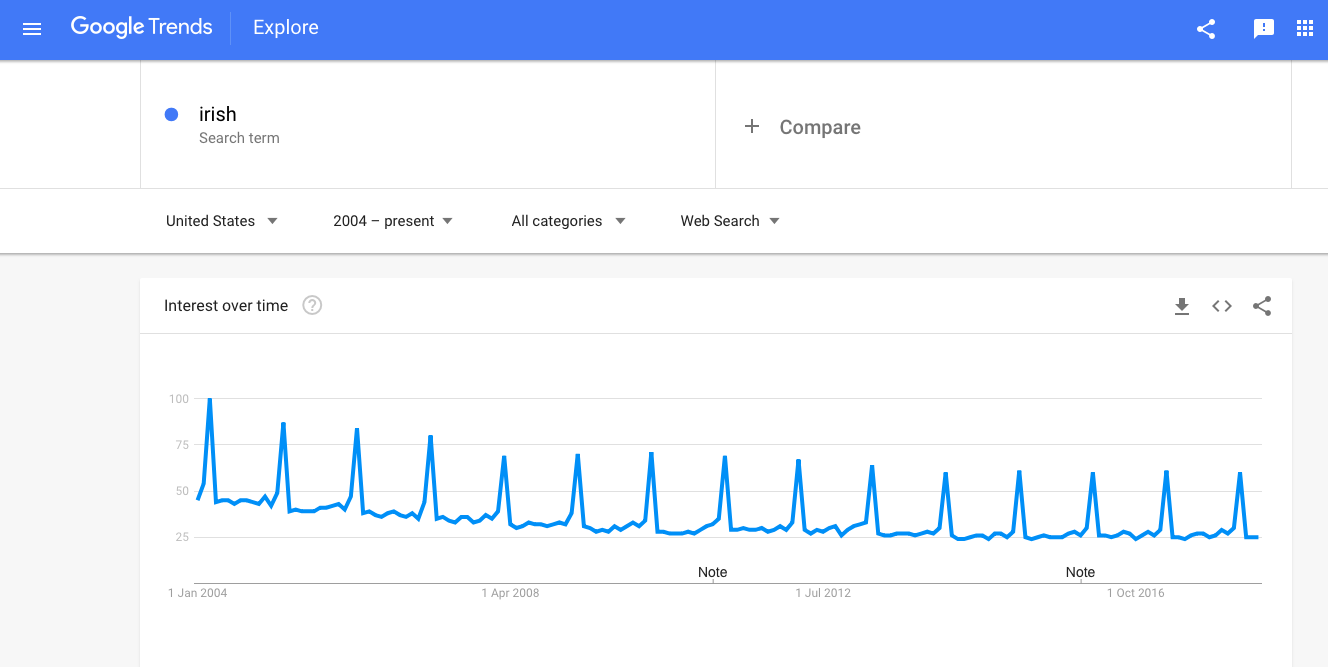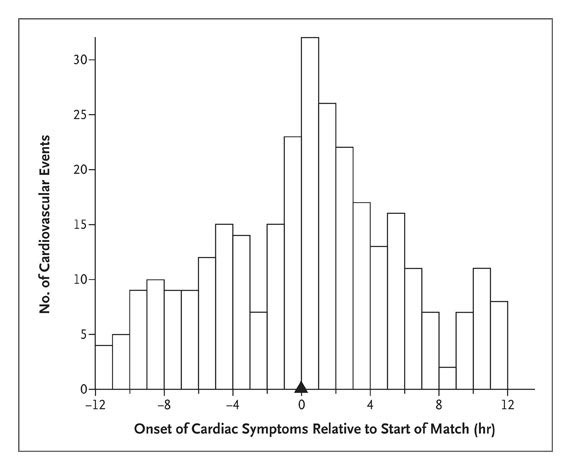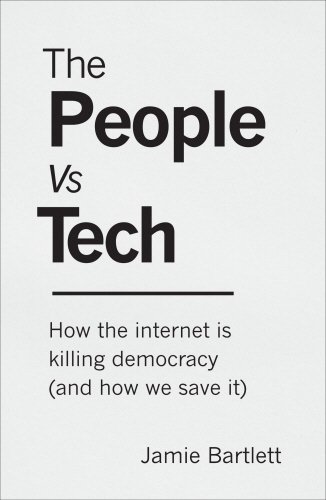This book is a summary of the recent news, research, non-fiction bestsellers and popular science relating to tech, in a political context. The author tries hard to maintain objectivity, but he ends up sitting on the fence and stating the non-offensive obvious rather than creating new insights. Perhaps, there is a certain irony in that: serious journalism doesn’t hit as hard as divisive tripe we’ve gotten used to on Facebook. Overall, it’s an entry level book for people who want to learn about tech vs politics.
On a personal note, I recently attended a conference on digital health where an IBM Watson guy described how it could make decisions that are 93% congruent with health professionals (source). That’s impressive. But just because it can, doesn’t mean it will. Ireland has decent IT in healthcare compared to most countries. Yet I still fax things a lot (welcome to the 80s). As a doctor, I often serve as a photocopying machine. I’ve seen radiology software pick some cool stuff up using algorithms, but it will be a long time before AI is on the front line of medicine, in my view anyway.
My highlights below (this is not to say I highlight things I agree with!)
…The digital technologies associated with Silicon Valley –social media platforms, big data, mobile technology and artificial intelligence –that are increasingly dominating economic, political and social life. It’s clear that these technologies have, on balance, made us more informed, wealthier and, in some ways, happier. After all, technology tends to expand human capabilities, produce new opportunities, and increase productivity. But that doesn’t necessarily mean that they’re good for democracy.
While there are certainly contradictions in minimising tax while claiming to empower people, doing so doesn’t necessarily betray insincerity.
The machinery of democracy was built during a time of nation-states, hierarchies, deference and industrialised economies. The fundamental features of digital tech are at odds with this model: non-geographical, decentralised, data-driven, subject to network effects and exponential growth.
We won’t witness a repeat of the 1930s, everyone’s favourite analogy. Rather, I believe that democracy will fail in new and unexpected ways. The looming dystopia to fear is a shell democracy run by smart machines and a new elite of ‘progressive’ but authoritarian technocrats.
Chapter 1: The New Panopticon
Social media platforms are the latest iteration of the behaviourist desire to manage society through scientific observation of the mind, via a complete information loop: testing products on people, getting feedback and redesigning the model.
The notion that with enough data the mysteries of the human mind can be understood and influenced is perhaps the dominant philosophy in Silicon Valley today.
Scientific theories were unnecessary, he [Chris Anderson, editor of Wired] said, now that we have big data.
Google engineers don’t speculate and theorise about why people visit one site over another –they just try things and see what works.
Our modern panopticon doesn’t have just one watchman: everyone is both watching and being watched. This kind of permanent visibility and monitoring is a way to enforce conformity and docility.
Being always under surveillance and knowing that the things you say are collected and shared creates a soft but constant self-censorship.
Diagnosis by AI will outperform professional doctors within a few years (it already does in many areas, but regulation is slower than tech).
Deny it if you want, but we already rely on the machine for moral choices.
I can imagine this kind of utilitarian thinking will take over the world, because it’s amenable to data and AI.
Chapter 2: The Global Village
We are living, as McLuhan predicted, through a great re-tribalisation of politics.
Humans were perfectly good at killing each other because of politics long before the iPhone turned up. But Silicon Valley, in its optimistic quest for a global village of total information and connectivity, has inadvertently let tribalism back out of the cage that modern representative democracy built for it.
At times ‘post-truth’ has become a convenient way to explain complicated events with a simple single phrase. In some circles it has become a slightly patronising new orthodoxy to say that stupid proles have been duped by misinformation on the internet into voting for things like Brexit or Trump.
Anyone who is upset can now automatically, sometimes algorithmically, find other people that are similarly upset. Sociologists call this ‘homophily’, political theorists call it ‘identity politics’ and common wisdom says ‘birds of a feather flock together’.
The point is that every individual now has a truckload of reasons to feel legitimately aggrieved, outraged, oppressed or threatened, even if their own life is going just fine.
Note how, for example, so many people who disagree with Brexit use the language of a small child that has yet to develop a theory of mind: why should I accept the result, I didn’t vote for it and I want my country back.
The liberals’ hopeful theory about the role of debate is that coming into contact with opposing views and opinions can help resolve difference.
Several inconvenient studies have found that if two groups of people debate with each other they often consequently hold more extreme views than when they started. 15
I see opposing views to mine online all the time; they rarely change my mind, and more often simply confirm my belief that I am the only sane person in a sea of internet idiots.
But being apparently neutral is itself a kind of editorial decision. Everything on social media is still curated, usually by some mysterious algorithm rather than a human editor.
But the problem is that no one is intentionally programming it to be sensationalistic –it’s just a mathematical response to our general preference for edgy and outrageous videos. This is both a mirror and a multiplier: a giant feedback loop powered by big data. You feed data in, and you get results that replicate themselves. Newspapers have always traded on outrage and sensationalism, because they’ve long known what algorithms have recently discovered about our predilections. However, the difference is that newspapers are legally responsible for what they print, and citizens generally understand the editorial positions of various outlets. Algorithms, however, give the impression of being neutral and can’t held to account –even though the YouTube algorithm alone shapes what 1.5 billion users are likely to see, which is more than every newspaper in the world combined.
In her masterpiece The Origins of Totalitarianism Hannah Arendt warned that if citizens float around like corks in a stormy sea, unsure of what to believe or trust, they will be susceptible to the charms of demagogues.
If the medium is the message, is there a way to escape the drift toward ever more extreme ‘system one’ tribal politics? Of course. Laws, regulations or education can help.
The qualities we associate with human greatness –such as sensitivity, empathy, compassion, kindness, and honesty –are also keys to political success.
At a campaign rally in Iowa in January 2016, Trump told his supporters that he could ‘stand in the middle of Fifth Avenue and shoot somebody and … wouldn’t lose voters’. There is a distinct and terrifying possibility that, in an era in which emotion outranks truth, bias outranks objectivity and tribe outranks compromise, he was right.
Chapter 3: Software Wars
Every election now is a mini arms race.
Just like Brad [Trump’s digital campaign guy], Cummings set up Vote Leave like a Silicon Valley start-up, with physicists, data, innovation and constant testing of ads or messages. One especially smart move involved inviting people to guess the results of all 51 matches in the Euro 2016 football tournament with the chance of winning £ 50 million, in exchange for their phone number, email, home address and a score of 1–5 in respect of how likely they were to vote for staying in the EU.
I was surprised when Theresa [Trump’s digital campaign figure] told me that social media employees –and ones who shared the campaign’s political views –were working directly with the Trump team, but perhaps I shouldn’t have been.
We used to call this sort of thing propaganda. Now we call it ‘a behavioral approach to persuasive communication with quantifiable results’, and give awards to the people who are best at it.
It is important that everyone receives the same message –or at least knows what others are receiving. That’s how we are able to thrash out the issues of the day. If everyone receives personalised messages, there is no common public debate –just millions of private ones.
When I was at Alamo, Theresa told me that she wrote many of Donald Trump’s Facebook posts. That was odd. I’d always assumed Trump wrote his own posts. I’d read many of them, and they certainly sounded like him. Nope, it was Theresa, sitting in her San Antonio office. ‘I channelled Mr Trump,’ she told me, smiling. ‘How do you channel someone like Donald Trump?’ I asked. ‘A lot of believe mes, a lot of alsos, a lot of verys … he was really wonderful to write for. It was so refreshing. It was so authentic.’ She seemed unaware of the irony.
Mark Zuckerberg seems to have had a Damascene moment towards the end of 2017, when he acknowledged that the company needed to behave more like a responsible publisher that takes editorial decisions, rather than as a neutral platform that treats all information equally. This will certainly help.
Far too many otherwise-intelligent people, unable to comprehend Trump’s popularity, believe that voters were duped by Brad or Theresa, or even by Vladimir Putin, into ticking the box for Trump. Those involved are happy to propagate this myth, because it’s good for business.
I don’t recall similar levels of outrage when it was revealed in 2012 that President Obama’s team had placed voters into 30 buckets and ranked them according to persuadability, and that Google’s Eric Schmidt advised the campaign. Liberals were apparently extremely comfortable with the idea when it was their guy doing it. That was a mistake.
Chapter 4: Driverless Democracy
When AI techniques transform medical diagnosis –within the next few years –it won’t mean fewer doctors, but better patient care because our busy doctors won’t need to spend hours staring at scans.
A specialist in machine learning at Starsky Robotics or Google performs a non-routine job, since it involves a lot of intuition, creativity and independent thinking in unpredictable situations. So does a gardener, carer or Deliveroo cyclist. It’s the jobs in the middle –what you might call ‘routine cognitive’ jobs –that will be most at risk. If you are a train operator, a mortgage adviser, a stock analyst, a paralegal, a credit analyst, a loan officer, a bookkeeper, a tax accountant or a radiologist, you might consider retraining.
High levels of inequality also wear away the fabric of society. The more unequal life gets, the less we spend time with people not like ourselves, and the less we trust each other.
‘There are40 million people in the US that live in poverty,’ he [Sam Altman, Y Combinator] said. ‘If technology can eliminate human suffering, we should do that; if technology can generate more wealth and we can figure out how to distribute it better, we should do that.’ There was no hint that tech has played some role in creating the problem that tech is now supposed to fix.
Chapter 5: The Everything Monopoly
Back in the 1990s many predicted that the internet would slay monopolies, not create them. The popular thinking of the time –repeated over and over by the era’s digital gurus and futurists –was that the net was decentralised and connected, and so would automatically lead to a competitive and distributed marketplace.
Market leaders in AI like Google, with the data, the geniuses, the experience and the computing power, won’t be limited to just search and information retrieval. They will also be able to leap ahead in almost anything where AI is important: logistics, driverless cars, medical research, television, factory production, city planning, agriculture, energy use, storage, clerical work, education and who knows what else.
At some terrible point, these tech giants could become so important to the health and well-being of the nation that they are, like large banks, too big to fail. Armed with the best tech and the most skilled engineers, maybe Google or Facebook could be the only ones who could solve sophisticated cybercrime (perhaps committed by a powerful AI from a hostile country?), fix computer bugs, predict and pre-empt economic shocks, run the National Grid or protect the cyber defences of the big banks –cyber security in the public sector is predictably understaffed and under-skilled.
Every politician, with only a few exceptions, values the support of business. But politicians need tech platforms to reach voters in a manner that they don’t need other businesses, and these companies own and run the platforms on which so much of our political debate occurs.
Chapter 6: Crypto-Anarchy
(Public key) encryption is the crypto-anarchist’s barbed wire. It allows people to communicate, browse and transact beyond the reach of government, making it significantly harder for the state to control information, and subsequently, its citizens. This is because of a simple-but-magic rule: due to some arcane properties of prime numbers, it takes far more computing power to decrypt something than to encrypt it. 3 It’s like an egg: a lot easier to crack than to put back in its shell. Julian Assange, who was an active contributor to Timothy May’s email list, puts it this way: ‘the universe believes in encryption’.
In the well-intentioned pursuit of privacy and freedom, we might risk undermining the entire edifice on which these rights are based. Most liberals have been very short-sighted about this, because they want total freedom and equality, without realising that the two are sometimes in tension. This is why the issue of encryption and privacy throws up peculiar political alliances. (The most notable of recent years is surely the idiotic social democratic love affair with crypto-anarchist Julian Assange.)
Democracy is about individual liberty of course, but that’s only half the picture. It is also a system of coercion because your liberty must sometimes be taken away too. The state must be able to force you to pay tax, remove your passport, restrict your right to assemble and back it up with the use of force if it needs to by arresting you and throwing you in prison.
A blockchain social media platform would be untouchable – no government would be able to edit or remove hate-speech, illegal images or terror propaganda, unless the whole network was somehow vaporised. Blockchain advocates hate ‘middle men’.
For reasons still not entirely clear to me, humanity is currently embarked on a quixotic quest to connect everything to everything else.
A recent survey in the Journal of Democracy found that only 30 per cent of US millennials (the demographic made up of those born since 1980) agree that ‘it’s essential to live in a democracy’, compared to 75 per cent of those born in the 1930s, and results in most other democracies demonstrate a similar pattern.
Conclusion: Say Hello to the Future
In the hands of a techno-authoritarian, all the digital tools of liberation could easily become powerful tools of subtle coercion that might make society run more smoothly but wouldn’t make us more free or hold the powerful to account.
Digital technology is behind the slow unravelling of power and control in democracies. The obvious monster is Scylla – turbo-charged inequality and social breakdown. But in trying to avoid it, democracies could end up in the thrall of Charybdis, a digitally powered techno-authoritarian, and wind up with China and Russia undermining democracy in the name of order and harmony.




